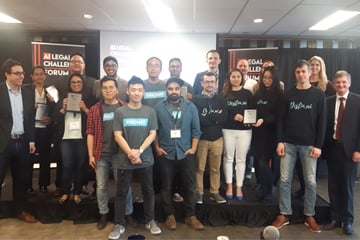A partnership with Ryerson University, its incubator space, and the Ministry of the Attorney General and $80,000 in seed money resulted in the AI Challenge Forum, a competition between six startups who have incorporated AI in their products for faster, more efficient and effective legal services to legal consumers.

A partnership with Ryerson University, its incubator space, and the Ministry of the Attorney General and $80,000 in seed money resulted in the AI Challenge Forum, a competition between six startups who have incorporated AI in their products for faster, more efficient and effective legal services to legal consumers.
The event took place March 23 at Ryerson University’s Legal Innovation Zone, the first legal technology incubator which focuses on building better legal solutions for the consumers of legal services. After a day of networking, demonstrating and pitching, the top three of the six finalists were declared winners before a room of legal professionals and AI connoisseurs.
Andrew Arruda, chief executive officer and co-founder of ROSS Intelligence, spoke about the importance of AI in the legal field and the dangers for lawyers who refuse to use AI in the future.
“AI is not about flying cars. It’s about the democratization of industries, including law. And it is not going to replace lawyers, but it will replace those not working with it,” he said.
Each startup was given12 minutes to present their pitches. However, the main criteria was to incorporate artificial intelligence in the products and demonstrate the benefits of the product towards the legal profession in the future in terms of speed, efficiency, and increased access to justice for everyone. The panel of judges asked each speaker questions. After deliberation, the panel of judges arrived at a verdict.
The first-place winner and recipient of $40, 000 in seed money was Evichat. Co-founded by Puneet Tiwari and Nilesh Pandey, Evichat is an eDiscovery tool that reduces costs, resources and time for lawyers to effectively collect and review mobile communications and social media data from other litigants.
The runner-up and recipient of $25,000 in seed money was Diligen. Co-founded by Laura van Wyngaarden and Konrad Pola, Diligen uses recent machine learning algorithms to enhance the process for due diligence at bigger law firms.
The second runner-up and recipient for $15, 000 was Splyt. Co-founded by Faiza Malik and Syed Hussaini, Splyt focuses on uncontested divorce in Ontario and utilizes artificial intelligence and machine learning to give consumers guidance with a quicker, inexpensive and more efficient divorce application process online.
The three other finalists given recognition were Destin AI, a startup founded by Nargiz Mammadova calling itself “the first AI based chatbot to support individuals in the immigration process,” Legalicity, a startup founded by Yaroslav Riabinin whose NLPatent program seeks to perfect the automation process of examining millions of patents quicker and more efficiently and Loom, a startup founded by Mona Datt which finds and sorts case law files and classified information in a shorter period of time.
Throughout the day there was a panel of judges and guest speakers from an array of various legal backgrounds including Arruda, Hersh Perlis, the director of the Legal Innovation Zone, Chris Bentley, the managing director of the Legal Innovation Zone, Shelby Austin, a partner at Deloitte LLP, Michel Hélie, assistant deputy attorney general of the civil law division, Lynn Norris, assistant deputy, attorney general of the modernization division and Christopher Johns, executive director innovation office, Ministry of the Attorney General.










